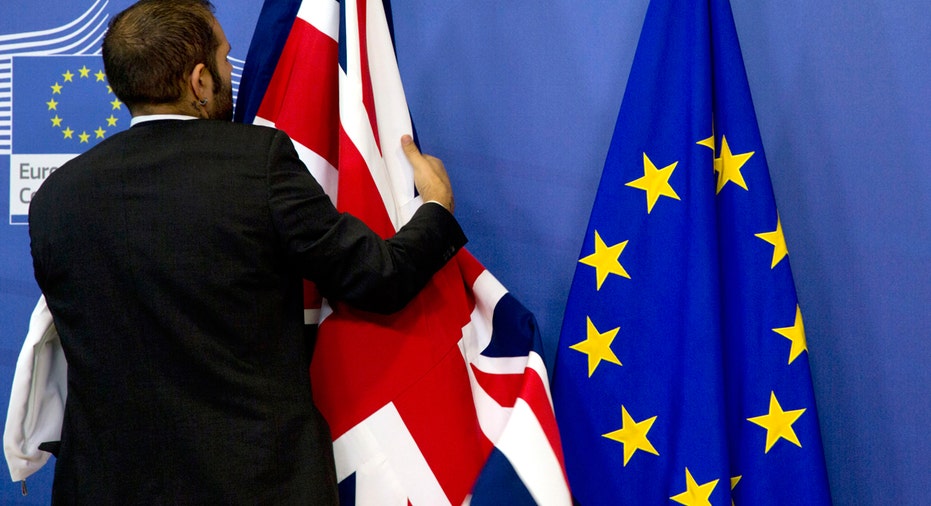Avoid Brexit-Induced Portfolio Shuffling as Sentiment Swings

Following a risk-off week in global markets, sentiment turned sharply higher Monday with four days until a vote in Britain about whether it should remain in the European Union. With sentiment thrashing between extremes, investors might be tempted to shift their allocations from risk on or risk-off positions, but market strategists say that's perhaps one of the worst things a long-term investor could do.
“You don’t let [Brexit] dominate your portfolio over the short term,” Paul Christopher, head global market strategist at Wells Fargo (NYSE:WFC) Investment Institute warned.

On Monday, traders charged ahead, diving into risk assets including U.S. equities as concerns over a so-called Brexit seemed to wane. Bond markets, which had seen yields dive last week as investors piled into the safe havens, reversed course to start the week. The yield, which moves inversely to the price, on the 10-year U.S. Treasury bond rose to 1.678% from 1.616% on Friday. Meanwhile, gold prices dropped more than 0.5% during the trading day as global equity markets rallied.
Sentiment turned sharply following a statement from the International Monetary Fund on Friday, which warmed Brexit could sock the U.K. economy, and after a sobering mood blanketed the region on Thursday after Jo Cox, a Member of Parliament and the Labor Party, was killed by an apparent pro-Brexit supporter.
Further boosting market sentiment was a poll by Survation/Daily Mail released over the weekend which showed support toward a "remain" vote gaining momentum. The data revealed 45% of those polled favored staying in the EU, while 42% supported a move to leave. A prior June 16 survey showed those numbers associated with the opposite sides. While sentiment appears to be shifting, the data are volatile, and Christopher warned investors should exercise caution when considering whether to reposition their portfolios.
As sentiment is subject to heavy swings, Christopher said investors looking to make safe plays can take profits where they can in their portfolios and look for opportunities for quality buys that have become cheaper thanks to declines in recent weeks amid heightened volatility. He stressed the importance, though, of being selective ahead of a potentially major market-moving event – no matter the outcome.
“[You could] take a little bit out of equities and put it into bonds in the short run…We took some profits in our underweight to high-yield and put that back into high yield. We put some cash on the sidelines and are waiting to see what happens,” he said.
Despite the solid move higher on Monday, volatility could still wreak havoc on global markets. Should the “leave” campaign be victorious at the outcome of Thursday’s vote, equity markets around the world are expected to reverse yet again as investors rush out of risk assets into safe-haven options.
The bottom line: As swiftly as sentiment has shown it can swing, it’s difficult to predict what the outcome of Thursday’s vote will be. David Joy, Ameriprise Financial chief market strategist, said the result is “awfully difficult to handicap” as odds makers still hold a much higher chance of a “remain” vote than do sentiment polls.
“You don’t let [Brexit] dominate your portfolio over the short term.”
“They reconcile those [differences] by saying historically as we get closer to an actual vote, the undecided voters break for the status quo,” Joy explained. “My expectation is that the vote will be to stay in the EU, but there’s enough risk in that decision that you have to be cautious.”
Joy said for last-minute movers, it’s not too late for investors to make tweaks to their portfolios. For investors with a shorter time horizon of between three and five years, it’s safe to maintain some diversity in asset allocation that includes riskier positions like European equities.
“If you’re more tactical or risk averse than that, you might want to protect yourself by lightening up on European equities, retreating to safe havens like gold, the Japanese Yen, and very short-term high-quality securities. It depends on what kind of investor you are,” Joy said.
In economic terms, though, he said the long-term impact on investors, even if the outcome is for the U.K. to leave the EU, would be less severe than the markets currently suggest.
“As a result, you probably don’t need to do too much [to your portfolio],” he said.
Jason Pride, director of investment strategy at Glenmede Trust, warned that investors don’t have “a good edge” in this situation to confidently position themselves for either outcome, acknowledging that it leaves investors with a “frustrating choice” to do nothing or hastily reposition themselves. While he recommends long-term investors should stomach the volatility, or discount a bit, he offered some non-traditional “insurance” plays that could help hedge extreme risk without upsetting long-term portfolios, though he noted they’ll come at a hefty price.
One such play is, as Joy suggested, reducing equity exposure in favor of fixed income.
“You’re reducing your long-term growth asset that should have decent upward single-digit returns going forward, in favor of something returning you 1% to 2%, which is a big opportunity cost to your portfolio," he said.
Other options: Look to lower volatility plays or higher-quality stocks, or perhaps look to snap up S&P 500 put options, which bet against the broad U.S. equity index and could yield better returns should the S&P 500 see a sharp downturn in the wake of the vote.
“Maintain equity exposure, but be invested in stocks that don’t exhibit economic and market sensitivity. In some cases, that could mean consumer staples, health care; In others you tilt further into industries and sectors and the decisions come down to nitty gritty details of what the corporate balance sheets, and earnings look like,” Pride suggested.
In the near-term, the sectors most likely to see heavy volatility in the wake of the referendum are economically-sensitive sectors like materials, industrials, energy, consumer discretionary, as well as financials.
Sill, Joy said that after the market’s knee-jerk reaction, even if the U.K. votes to leave the EU, it would still take time to unwind the nation from the bloc, and markets would begin to find equilibrium.
“The expectation is it would take up to two years before the U.K. could actually even leave the EU. So, I would guess long before then, you would see things calm down,” he said.



















